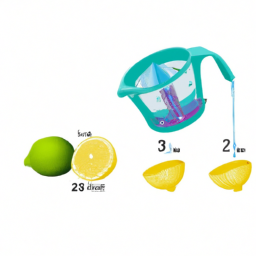As a chef, I often find myself needing to use lemon juice in my recipes. Whether it’s to add a zesty flavor to dressings or to tenderize meats, the amount of lemon juice needed can vary greatly from recipe to recipe. That’s why it’s important to know how much juice you can get from one lemon and how to extract it efficiently.
In this article, I will dive into the data-driven world of lemon juice and share with you everything you need to know about how much juice is in an average lemon.
First and foremost, it’s important to define what we mean by an ‘average’ lemon. The size and type of lemon can greatly affect the amount of juice contained within it. Therefore, for the purposes of this article, I will be referring to a standard-sized Eureka or Lisbon lemon, which are the most common types found in grocery stores.
By understanding the average amount of juice in this type of lemon, chefs and home cooks alike can accurately measure and adjust their recipes to achieve the desired flavor and acidity.
So, let’s dive into the data and find out just how much juice is in an average lemon.
Key Takeaways
- The amount of juice in an average lemon can vary depending on factors such as the variety and size of the lemon.
- Techniques such as rolling the lemon, microwaving, or using a juicer can help extract more juice from a lemon.
- Measuring the amount of juice extracted is important for adjusting recipes to taste and for substituting with other citrus juices such as lime.
- Storing lemon juice in the refrigerator is a better option for preserving it, but freezing can also be done with proper techniques.
The Importance of Knowing the Amount of Lemon Juice
You gotta know how much lemon juice you’re working with if you want your recipes to turn out just right! Lemon juice is one of those ingredients that can make or break a dish. Knowing the benefits of lemon juice and how much to use is crucial to creating delicious meals.
Not only is lemon juice a great flavor enhancer, but it also has many health benefits. It contains high levels of Vitamin C, which boosts the immune system and helps fight off infections. Lemon juice also aids in digestion and can help detoxify the body.
With all of these benefits, it’s important to know just how much lemon juice to use in your recipes. So, let’s explore what is an average lemon and how much juice it contains.
What is an Average Lemon?
Hey there, have you ever wondered what size lemon to use for your recipe? When it comes to lemon juice extraction, understanding the average size of a lemon is crucial. This is because different lemon varieties come in different sizes, and using the wrong size can affect the overall taste and acidity of your dish.
There are many types of lemons available, such as Eureka, Lisbon, and Meyer lemons, all of which have varying sizes. However, on average, a lemon usually weighs around 3 to 4 ounces. The size of a lemon can be determined by looking at its shape and color. A ripe lemon will be yellow and oval-shaped, with a diameter of around 2 to 3 inches.
Knowing the average size of a lemon can help you determine the amount of juice needed for your recipe and ensure that the taste of your dish is consistent.
So, now that we understand what an average lemon is, let’s move on to the next question: how much juice is in an average lemon?
How Much Juice is in an Average Lemon?
When using a lemon for your recipe, it’s important to know just how much juice you can expect to extract from the fruit. The amount of juice in an average lemon can vary depending on factors such as its ripeness, size, and the techniques used to extract the juice. To give you an idea, take a look at the table below which compares the average amount of juice in a small, medium, and large lemon.
| Lemon Size | Juice Yield (in ounces) |
|---|---|
| Small | 1-2 |
| Medium | 2-3 |
| Large | 3-4 |
To extract the most juice from your lemon, it’s important to use effective squeezing techniques. One common method is to roll the lemon on a hard surface before cutting it in half and using a citrus juicer or squeezing by hand. Another technique is to microwave the lemon for a few seconds to help release the juices. Using these methods can help you get the most out of your lemons for your next recipe.
When considering the amount of juice yield from a lemon, it’s important to note that there are differences between Meyer lemons and regular lemons. These variations can affect the flavor and acidity of your dish. Let’s explore these differences in the subsequent section.
Differences in Juice Yield between Meyer Lemons and Regular Lemons
Did you know that Meyer lemons, a popular variety of citrus fruit, contain up to twice as much pulp as regular lemons? This makes them a great choice for recipes that require a higher juice yield.
Meyer lemons are also known for their sweeter flavor, making them a favorite among bakers and chefs alike. However, because of their higher pulp content, it can be more difficult to extract the juice from Meyer lemons compared to regular lemons.
When it comes to juice extraction techniques, there are a few differences between Meyer and regular lemons. Some people find that rolling the lemon on a hard surface before juicing can help break down the pulp and release more juice. Others recommend microwaving the lemon for a few seconds to warm it up and make it easier to juice.
Ultimately, the key to getting the most juice out of your lemon is to experiment with different techniques until you find the one that works best for you. In the next section, we will explore some additional techniques to extract more juice from a lemon.
Techniques to Extract More Juice from a Lemon
To maximize your yield when juicing lemons, it’s essential to try out various techniques that work best for you. Here are four techniques you can use to extract more juice from a lemon:
-
Microwave the lemon for 10-15 seconds before juicing it. This softens the lemon and makes it easier to extract more juice.
-
Roll the lemon on the countertop before cutting it. This helps break down the membranes inside the lemon and allows for more juice to be released.
-
Use a lemon squeezer or hand juicer instead of just squeezing the lemon with your hands. This ensures that you get more juice out and minimizes the amount of pulp and seeds that end up in the juice.
-
Cut the lemon in half crosswise instead of lengthwise. This exposes more of the lemon’s juice sacs and allows for more juice to be extracted.
By using these techniques, you can extract the maximum amount of juice from your lemons and ensure that you have enough for your recipes.
Speaking of recipes, it’s important to measure the amount of juice you extract to ensure recipe accuracy.
The Importance of Measuring Juice for Recipe Accuracy
To ensure your recipes turn out perfectly, it’s crucial that you accurately measure the amount of juice you extract from a lemon. Measuring precision is key to recipe modification, and the juice of a lemon can make the difference between a mediocre dish and a culinary masterpiece.
When following a recipe, it’s essential to stick to the precise measurements of lemon juice called for. Too much or too little juice can significantly impact the flavor profile of the dish. Measuring lemon juice is not difficult, but it does require attention to detail. By using a citrus juicer or a hand-held reamer, you can measure the exact amount of juice required for a recipe.
With this level of precision, you can modify recipes to your taste, ensuring that every dish you prepare is perfect.
As important as measuring juice is, sometimes a recipe may still need adjustment for taste. In the subsequent section, I’ll discuss how to modify recipe ingredients to achieve the desired flavor.
Adjusting Recipes for Taste
Adjusting recipes can make all the difference in creating a mouthwatering dish that will leave your taste buds dancing with delight. When it comes to using lemon juice in recipes, balancing tartness is crucial, especially since the amount of juice in an average lemon can vary.
If you find a recipe too tart, you can adjust it by adding a sweetener, such as honey or sugar, to balance it out. Additionally, alternative substitutions can be made to add a different flavor profile to the dish. For example, lime juice can be used instead of lemon juice in recipes that call for a more tropical taste. Remember to start small and taste as you go, adding more as needed until you achieve the desired flavor balance.
As we move onto other uses for lemon juice, it’s important to note that adjusting recipes for taste is just one aspect of cooking with this versatile ingredient.
Other Uses for Lemon Juice
You may not realize it, but lemon juice has a multitude of uses beyond adjusting the taste of recipes. Here are some of the benefits of using lemon juice as an alternative to other household products:
-
Lemon juice can be used as a natural cleaner for cutting boards, countertops, and other surfaces. Its acidic properties can help remove stains and disinfect the area.
-
Lemon juice can also be used as a natural air freshener. Simply mix it with water in a spray bottle and mist the air to remove unpleasant odors.
-
Lemon juice can be used as a natural alternative to bleach for removing stains from clothing. Its acidic properties can help break down the stain and brighten the fabric.
-
Lemon juice can be used as a natural insect repellent. Simply mix it with water in a spray bottle and spray around doors, windows, and other entry points to keep bugs at bay.
As you can see, lemon juice is a versatile product that can be used in many different ways. Next, we’ll discuss the best ways to store lemon juice to ensure its freshness and effectiveness in your household tasks.
Storing Lemon Juice
When it comes to storing lemon juice, there are two primary options: refrigeration or freezing. Personally, I prefer to refrigerate lemon juice as it can last for up to a week when stored properly in an airtight container.
Freezing lemon juice is also an option, but it can alter the taste and consistency of the juice, so it’s important to use it within a few months.
Refrigeration
Hey, did you know that refrigerating your lemons can help keep them fresh and juicy for longer? Not only does refrigeration slow down the natural ripening process of lemons, but it also helps in preserving their nutritional value. Moreover, refrigeration is an energy-efficient method of maintaining the freshness of lemons, as it helps in reducing the energy required to keep them fresh.
When it comes to environmental impact, refrigeration is a better option than leaving lemons out at room temperature. By keeping lemons refrigerated, we can reduce the amount of food waste that goes to landfills. Additionally, refrigeration helps in reducing greenhouse gas emissions that are produced during the natural decomposition of food waste.
So, if you want to keep your lemons fresh and reduce food waste, refrigeration is the way to go.
Speaking of keeping lemons fresh, did you know that freezing is another option to extend their shelf life?
Freezing
Freezing is a great way to make your lemons last longer and have them on hand for all your cooking needs. There are a variety of freezing techniques that can be used to preserve the freshness of your lemons.
One method involves washing the lemons thoroughly and drying them completely. Then, cut them into slices or wedges and place them in a single layer on a baking sheet. Once frozen, transfer the lemon slices or wedges into a freezer-safe container or bag. This method is great for adding lemon flavor to drinks, dishes, and desserts.
Another method is to freeze whole lemons. This technique involves washing the lemons thoroughly and drying them completely. Then, place the whole lemons in a freezer-safe container or bag and freeze them. This method is perfect for those who want to use the lemon juice and zest later. When ready to use, thaw the lemons at room temperature or in the refrigerator. The texture of the lemons may be slightly altered by the freezing process, but the flavor remains intact.
Freezing is an excellent way to preserve the freshness of lemons and ensure that you have them on hand whenever you need them. Whether you prefer to freeze lemon slices or whole lemons, these techniques will allow you to enjoy the taste and benefits of lemons for a longer period of time.
Frequently Asked Questions
Can you use bottled lemon juice instead of fresh lemon juice in recipes?
Yes, bottled lemon juice can be used in cooking applications as a substitute for fresh lemon juice. However, it’s important to note that bottled lemon juice may contain preservatives and may not have the same taste as fresh lemon juice.
How long can you store fresh lemon juice in the refrigerator?
I researched the best preservatives for storing fresh lemon juice in the refrigerator. Vitamin C and citric acid are effective in preserving the juice for up to six days. Proper storage in an airtight container is crucial to maintain freshness.
Is there a difference in the amount of juice between organic and non-organic lemons?
I have found that there is no significant difference in the amount of juice between organic and non-organic lemons. However, studies have shown that organic lemons may have a slightly better taste and higher nutritional value compared to non-organic ones.
Can you freeze fresh lemon juice for later use?
Freezing lemons is a great way to preserve the juice for later use in lemon juice recipes. Simply squeeze the juice, store it in an airtight container, and freeze. As for how much juice an average lemon yields, that varies.
Are there any health benefits to drinking lemon juice?
There are numerous health benefits to drinking lemon juice. It can aid digestion, boost immunity, and improve skin and hair health. Lemon water benefits include increased hydration and detoxification of the body.
Conclusion
In conclusion, understanding the amount of juice in an average lemon is crucial for accurate recipe measurements and taste adjustments. It’s like having a compass in the kitchen, providing direction and precision.
By knowing the yield of an average lemon, you can make adjustments to your recipes and achieve the desired flavor profile. Additionally, techniques such as microwaving or rolling the lemon before juicing can help extract more juice from each fruit.
It’s also important to remember that juice yield can vary between different types of lemons, such as Meyer lemons versus regular lemons. By being aware of these differences, you can adjust your recipe accordingly.
And don’t forget that lemon juice has many other uses beyond cooking, such as cleaning and preserving fruits and vegetables. By storing lemon juice properly, you can always have this versatile ingredient on hand.
So, let’s raise a glass of lemonade to the power of knowledge and precision in the kitchen!









